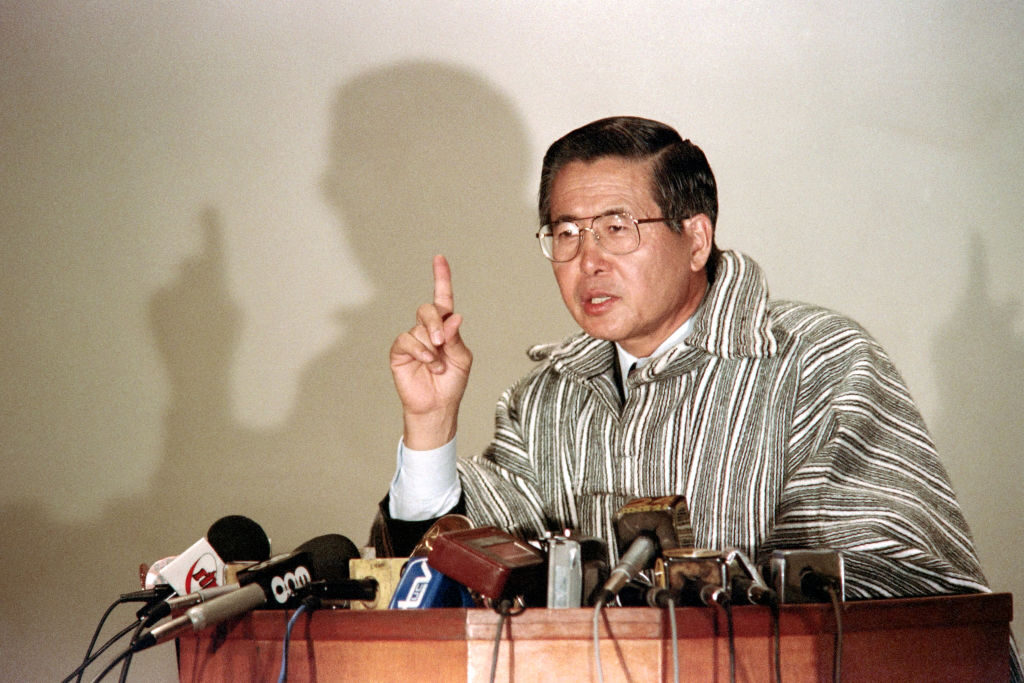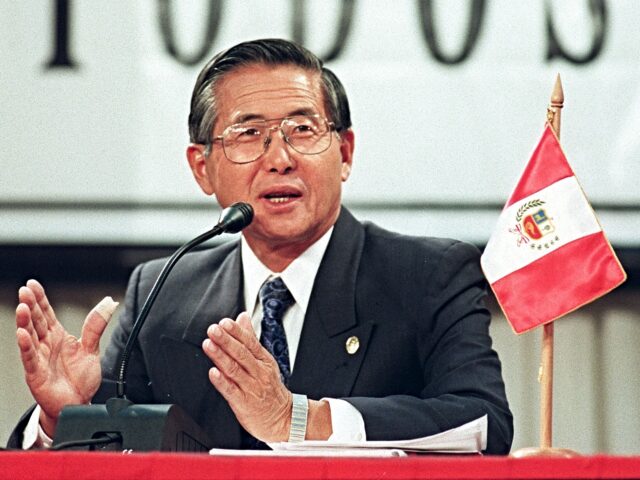Former Peruvian President Alberto Fujimori, credited for taking down the communist Shining Path insurgency in the 1990s but imprisoned for 25 years on charges of human rights abuses and corruption, died on Wednesday. He was 86.
Daughter and head of the conservative Popular Force party Keiko Fujimori, a perennial presidential candidate in the country, announced her father’s passing.
“After a long battle with cancer, our father, Alberto Fujimori, just departed to meet the Lord. We ask those who cherished him to accompany us with a prayer for the eternal rest of his soul,” the younger Fujimori wrote on social media, signing the message on behalf of her siblings. “Thank you for so much, papa!”
Fujimori governed Peru from 1990, when he won a decisive electoral victory, to 2000, when he abruptly fled the country to Tokyo, Japan, following allegations of electoral fraud in that year’s election. His tenure in office was marked by a resounding victory in the war against communist terrorist guerrillas and a series of actions that his detractors condemned as undemocratic and a violation of the human rights of Peruvians, including the famous 1992 “auto-coup” that dissolved Congress and military actions intended to degrade terrorist organizations that allegedly also resulted in the deaths of innocents.
Fujimori was also the head of a family that made dramatic political headlines for decades, from former wife Susana Higuchi running for president against him in 1995 – forcing daughter Keiko to serve as first lady at age 19 – to Keiko and sibling Kenji’s political feuding prompting the resignation of former President Pedro Pablo Kuczynski in 2018.
As one of the last Peruvian presidents to hold the public office for more than a full presidential term, Fujimori’s legacy looms large in the nation’s politics, as does that of his children. Fujimori remains an extremely divisive figure in Peruvian politics, as do his children in public life.
Fujimori, whose parents were Japanese immigrants, entered politics in 1988 as an outsider candidate, promising to fix the nation’s economy and eradicate a wave of communist terrorist organizations that included Shining Path and the Tupac Amaru Revolutionary Movement (MRTA). Despite his ethnic origin, he campaigned under the nickname chino (“Chinese man”) and organized major political rallies featuring danceable “chino” theme songs.
As president, Fujimori empowered the military to attack terrorist guerrillas with force, resulting in the capture of the founder of Shining Path, Abimael Guzmán, in 1992. To humiliate the communist terrorists, Fujimori displayed Guzmán in a cage wearing a cartoonish prisoners’ uniform, from which reporters and other bystanders could hurl insults at him. As Shining Path was largely structured as a personality cult, it struggled to replace Guzmán and largely fizzled out following his capture as a threat, though it began regrouping and enslaving indigenous people in rural Peru in the 2010s.
A “truth and reconciliation” commission found Shining Path was responsible for killing at least 12,500 people in its heyday and was the most prodigious communist terror force of its time in Peru.
Fujimori also greatly diminished other communist terrorist organizations such as the MRTA. One of his largest national security victories occurred in 1997 when the Peruvian armed forces swiftly liberated 71 or 72 hostages taken by the MRTA at the home of Japanese Ambassador to Lima Morihisa Aoki.
Outside of the battle with the terrorist guerrillas, however, Fujimori’s tenure was marked by political turmoil. In the same year Guzmán was captured, Fujimori forcibly dissolved Congress – a move since referred to as an “auto-coup” or Fujimorazo – on the grounds that legislators were impeding the success of the war on terror. Fujimori won reelection in 1995 largely on the back of his success against terrorism, even as Higuchi, still his wife, ran a campaign against him accusing Fujimori of torturing her while serving as first lady.
Fujimori’s downfall came five years later, when he “won” a third term as president in an election widely considered fraudulent. Unable to withstand the political pressure, Fujimori fled to Tokyo, where he resigned.
The former president spent much of the 2000s evading extradition and facing a wave of criminal accusations, first stemming from the publication of videos that appeared to show former top adviser Vladimiro Montesinos handing out bribes to lawmakers. Ultimately, Fujimori was extradited back to Peru – not before attempting an unsuccessful run for the Japanese Diet – and was convicted in 2009 and sentenced to 25 years in prison for targeted assassinations during the war on terror, illegal payments to congressmen, and other transgressions.

File/Peruvian President Alberto Fujimori addresses a press conference in Lima, Peru, on September 14, 1992, two days after the capture of the Shining Path leader Abimael Guzman. Fujimori declared that he was in favor of the death penalty for Guzman whose rebel group is held accountable for the killing of 25,000 people over 12 years. (JAIME RAZURI/AFP via Getty Images)
Fujimori’s family spent much of his time in prison seeking a pardon for the former president on medical grounds and sharing stories attempting to endear him once again to the public. In 2017, son Kenji shared an anecdote in which his father allegedly welcomed another former president, socialist Ollanta Humala, to prison. Humala, who defeated Keiko Fujimori to become president and rejected pardon requests for the elder Fujimori during his tenure in 2013, was imprisoned on corruption changes.
Fujimori reportedly used his prison food supply to make sandwiches to welcome Humala, Kenji Fujimori claimed, and scolded his son for not shaving before seeing a former president prior to visiting Humala.
Kuczynski, the former president, granted a pardon to Alberto Fujimori in 2017, but Peruvian courts overturned the pardon and Kuczynski himself was ousted after Popular Force, Keiko Fujimori’s party, published videos showing Kuczynski’s political coalition bribing Kenji Fujimori. Keiko herself has been implicated in the continent-wide corruption scheme centered around the now-defunct Brazilian contractor Odebrecht.
The post-Fujimori presidential landscape has been chaotic, featuring a parade of candidates winning the executive position by defeating Keiko Fujimori, only to be impeached and/or arrested. Peru has had six presidents between 2016 and 2024. The latest, Dina Boluarte, took office in 2022 after President Pedro Castillo, a hardline Marxist who defeated Keiko Fujimori in the 2021 election, was accused of attempting to stage a coup and arrested a year after his victory.
Fujimori ultimately received permission to leave prison in 2023, at age 85, on humanitarian grounds. In July, Keiko Fujimori announced her father was interested in running in the 2026 presidential election.

COMMENTS
Please let us know if you're having issues with commenting.